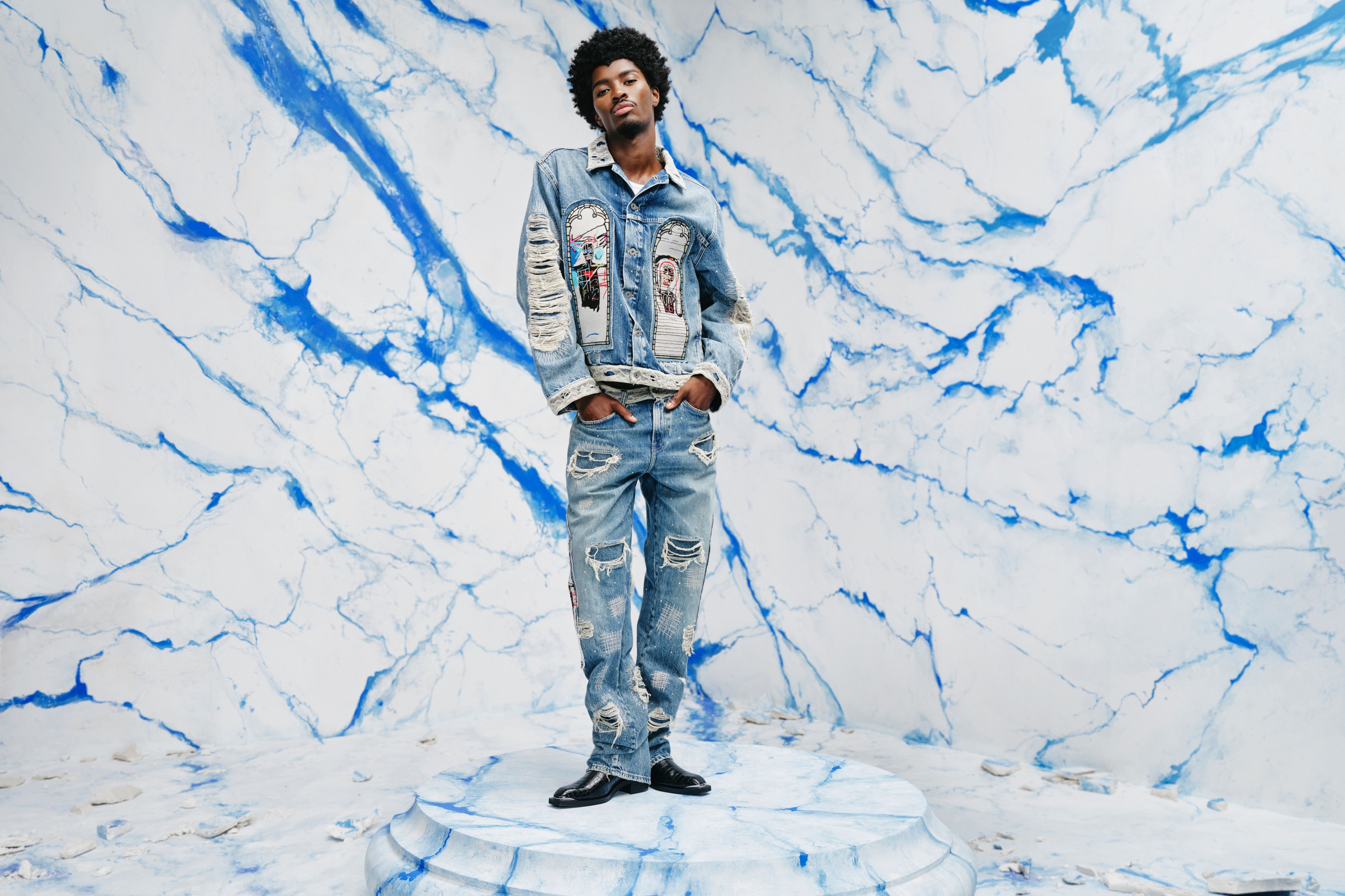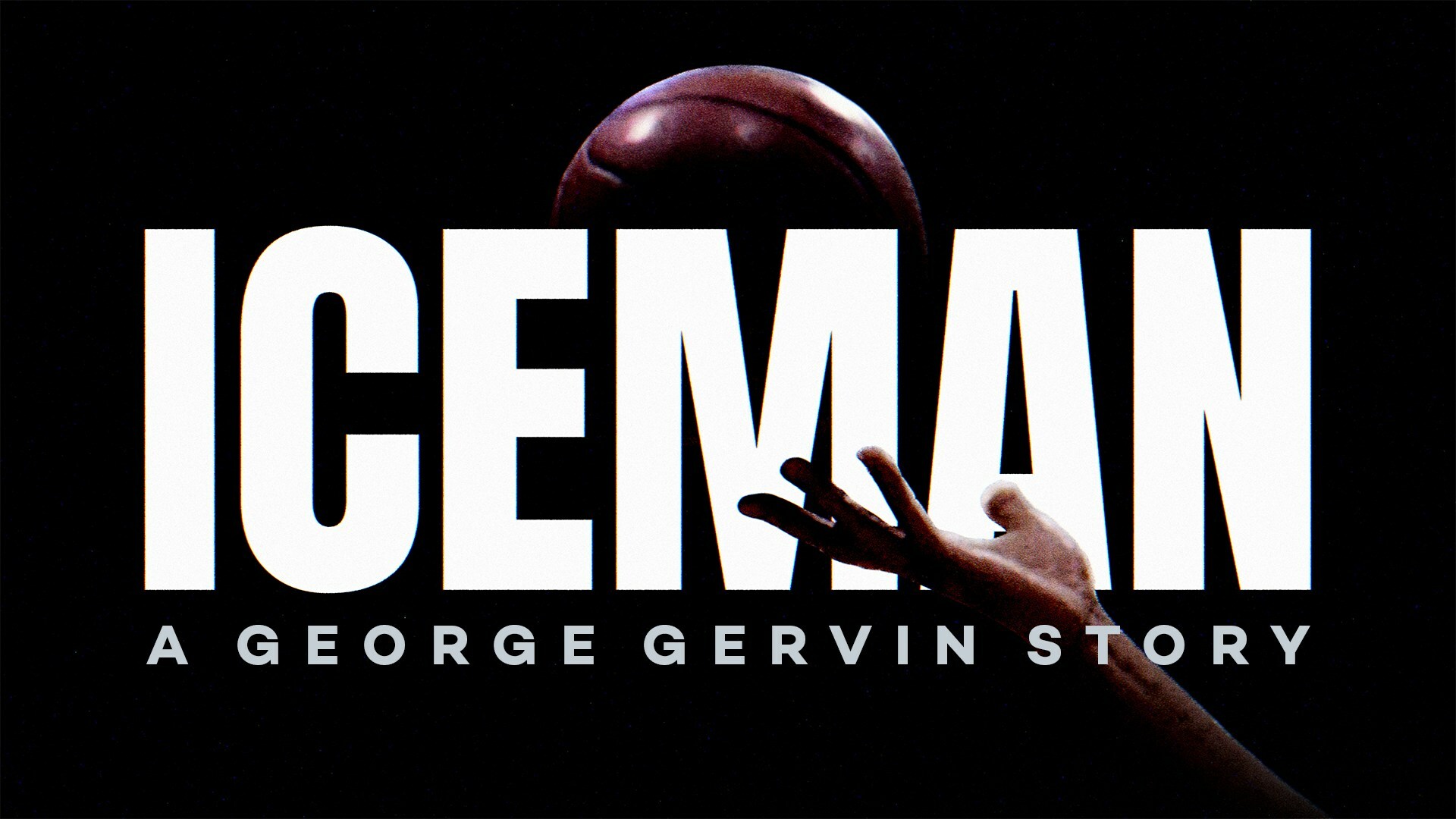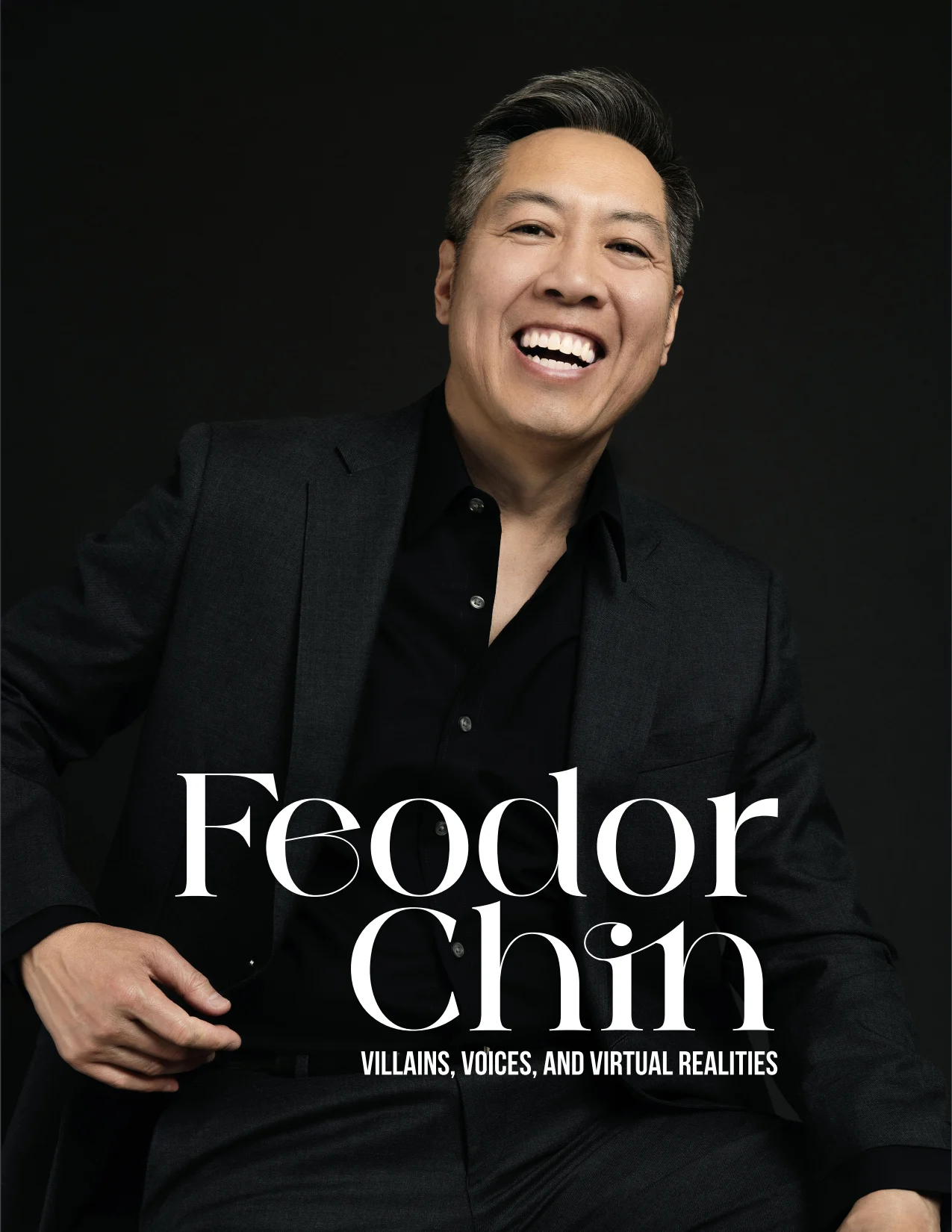
Feodor Chin Is Everywhere—And Nowhere You’d Expect
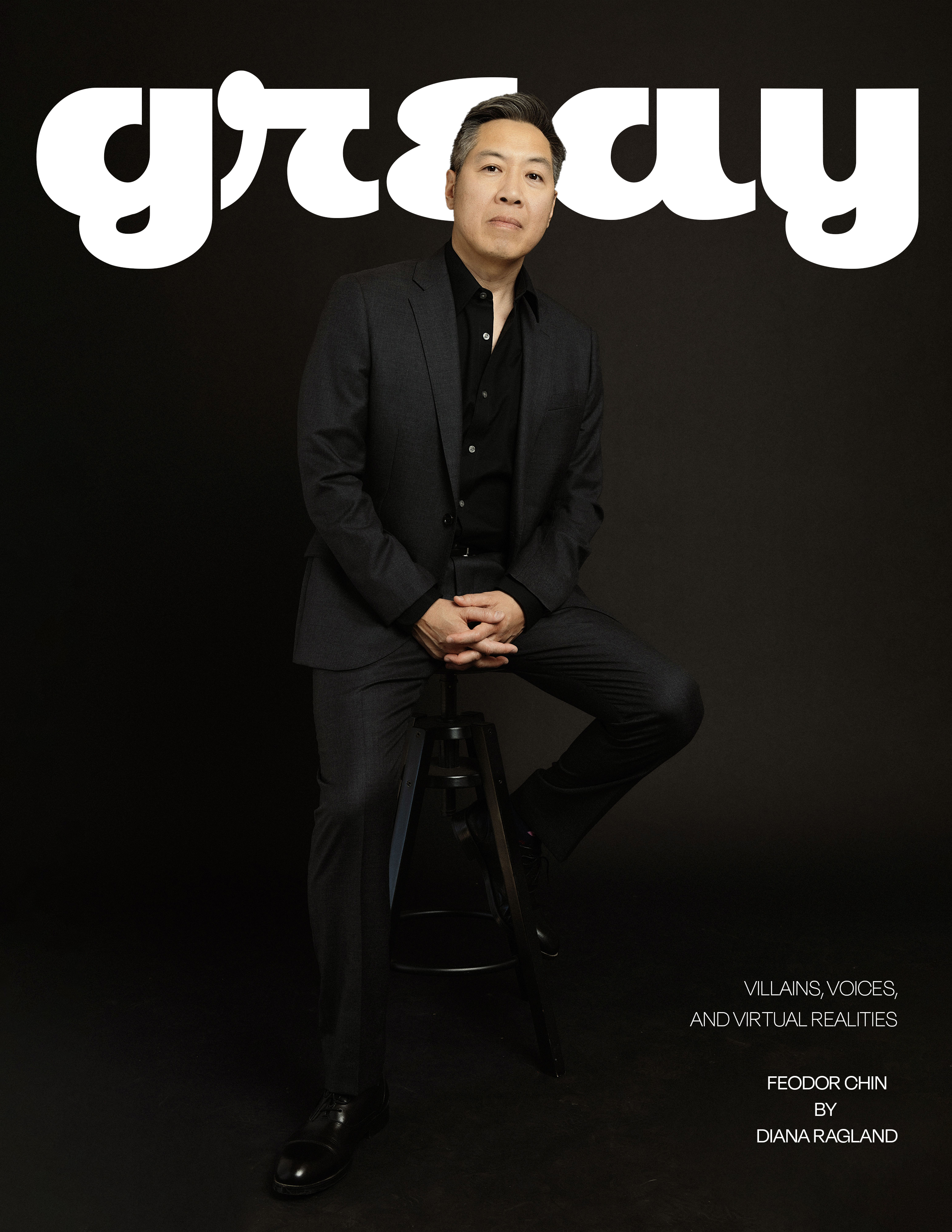
By Kyra Greene
Photos By Diana Ragland
Feodor Chin doesn’t just play characters—he channels them. Whether he’s voicing a meditative monk in Overwatch, embodying a ruthless warlord in Ghost of Tsushima, or making his villainous debut as Jade Prime in Love, Death + Robots, Chin brings more than performance—he brings presence. A storyteller across mediums and dimensions, his work spans the silly to the seismic, the stage to the screen, all rooted in a deeply human understanding of craft. In this candid conversation with Greay Magazine, Chin opens up about killing his own character, redefining representation, and why performance capture might just be the future of storytelling.
You’re making your villainous debut in Season 4 of Love, Death + Robots. What can you tell us about your character—and what drew you to playing a darker role in this anthology series? Bad guys have more fun. It’s true. So you bet I was excited to play Jade Prime, Spider Rose’s arch-nemesis. He’s pure evil and it was delicious. But the really fun thing was I also got to play Diego, the love of Rose’s life whom Jade Prime murders. So I got to kill myself! It’s not often you get to cover both sides of the coin like that but Love, Death + Robots has always been about unique stories uniquely told and this season is no different. The amazing Emily O’Brien and I were at Blur Studios doing full performance capture with the visionary Jennifer Yuh Nelson directing and I think you’ll agree that “Spider Rose” is an episode you won’t soon forget.
- You’ve voiced some of the most iconic characters in gaming—Zenyatta, Lee Sin, Lord Adachi. How do you approach voice acting differently from on-camera work? I always say if you can act, you can voice act. In general, I don’t really believe there is a difference between voice acting and acting on-camera. In both cases as an actor you’re using your instrument to help tell this story. On-camera you get to use your entire instrument, your face, body, and voice while for voice acting you can only use your voice but the goal and methods used to achieve it are the same. I do make one exception however and that’s for video games. Unlike movies and TV shows in which the audience is passive, in video games the player is an active participant in the story. So as an actor in a video game I think you have some leeway to “dial up” your performance sometimes in order to get the player to be more actively engaged.
- You’ve trained with Larry Moss and studied both classically and in comedy improv. How does that diverse training shape your performances across mediums like animation, stage, and screen? Every actor has a toolbox filled with the methods, training, and life experiences they use to create performances. I dig into my toolbox everyday and am always looking to add to it. For me, acting both on stage and onscreen has really helped tremendously when it came to motion capture work which I would describe as shooting a film and performing in a play at the same time. Or shooting a close up and a wide shot at the same time. You have to keep the subtlety and nuance in your face while expressing “big” physically with your body. It can be tricky but thankfully I could pull what I needed from my toolbox.
- What was it like voicing Xu Wenwu opposite Cate Blanchett in Marvel’s What If…?—especially since the character was originated by Tony Leung? That is truly one of the roles I am most proud of as I am a HUGE fan of both Cate Blanchett and Tony Leung. They are both two of our finest actors working today. So it was an honor and a privilege that I absolutely cherished.
- In The Far Country, your performance as Gee earned you a Best Lead Actor nomination. How did that story—and playing a character during the Chinese Exclusion era—resonate with you personally? Actually, I got the nomination and the award! The entire experience was really special. I got to return home to the San Francisco Bay Area and tell this story at Berkeley Rep which is very much my own family’s history. The character I played could very well have been my own great grandfather. And especially in these times in which immigrants are being scapegoated and vilified it’s more important than ever to tell these stories and remind the world that America was built by immigrants and enslaved people and that diversity is absolutely a strength.
- From Big Little Lies to Futurama to indie films like Scrambled, you’ve moved fluidly through genres and formats. What do you look for when choosing your next role? Actors are storytellers. So just gimme a great story to tell and I’m in heaven.
- In an industry that still grapples with Asian representation, how do you navigate roles that challenge stereotypes—and when do you choose to rewrite the narrative entirely? In an ideal world any actor would be able to play any role regardless of race, ethnicity, gender, sexuality, etc. Unfortunately we don’t live in that world and because of historic inequities and discrimination we must be mindful of the stories we tell and how we tell them. In my own career I’ve been fortunate enough to play a variety of roles and never felt I had to deny any part of myself to play them. To me it always comes down to humanity. Is this character a real human being? Yes? Then I can absolutely play that.
- You’ve created your own work, like Spice It Up and Chinatown Squad. As a writer and director, how has creating your own content empowered you as an actor? It is very empowering to create your own content because you’re creating your own opportunities. I absolutely encourage any actor who feels like they have a story to tell to dig into it and see what gold they can find.
- You’ve now taken over as Leo Wong on Futurama. What was the process like stepping into a role previously voiced by someone else—and how did you make it your own? Billy West was incredibly gracious and kind and it was absolutely an honor to step into the role of Leo Wong after him. My first session was actually live in studio with Billy, John DiMaggio, and Lauren Tom so you can imagine what a thrill it was to get to play with them all. I wasn’t really concerned with trying to match Billy’s voice but more Leo’s attitude. He’s a real sassy guy and can say some of the craziest things in a very matter of fact way so I was really trying to capture that.
- As someone who’s narrated over 100 audiobooks, how do you keep each performance fresh and authentic, especially when you’re the sole voice guiding the listener’s imagination? My acting coach Larry Moss always tells us the actor’s primary job is to tell the writer’s story. That’s it. That’s your job. And with audiobooks you are literally doing just that.
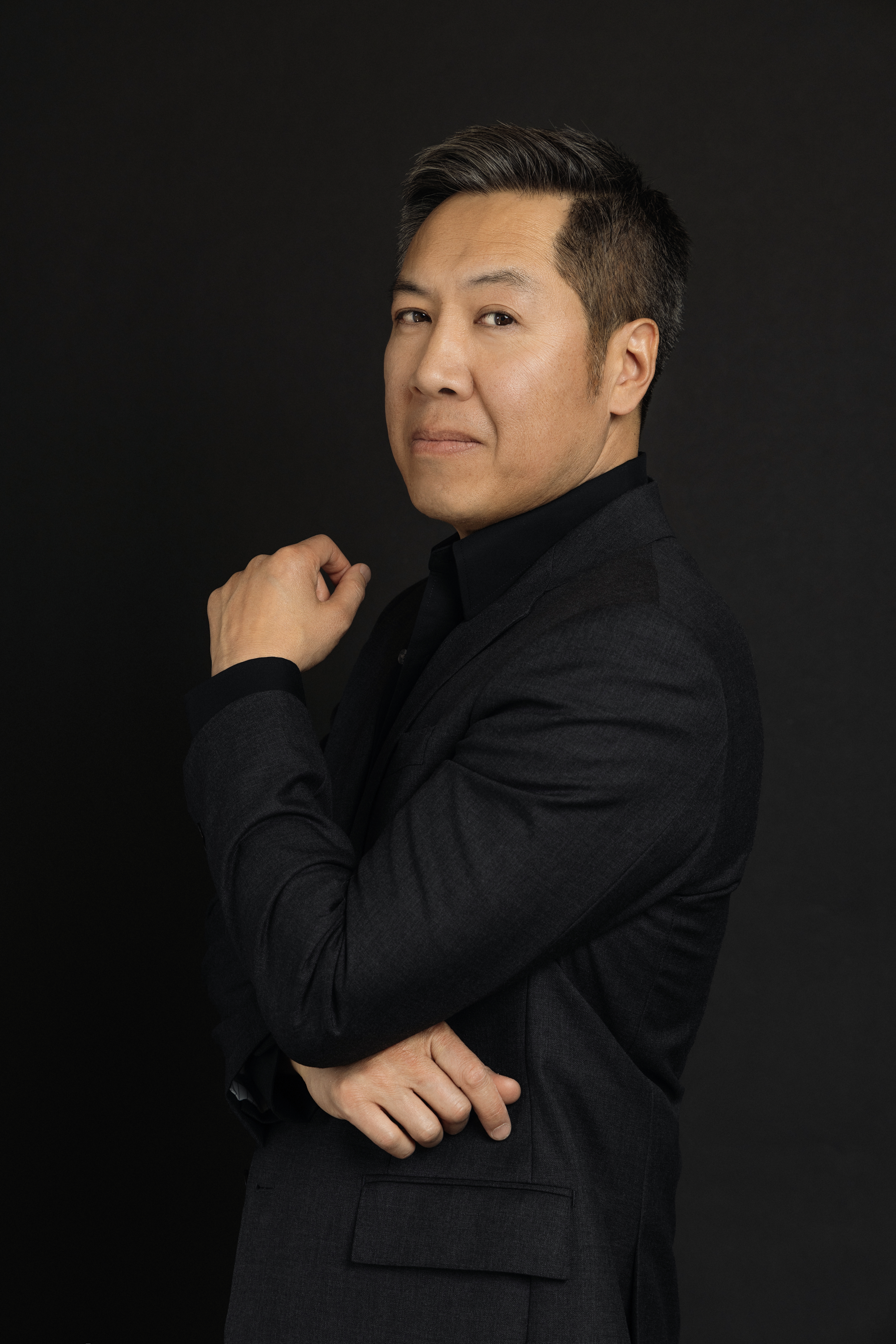
- Gaming fans are passionate—have you had any memorable encounters with fans of Overwatch or League of Legends that made you reflect on the impact of your work? Overwatch has taken me around the world. Australia, the Philippines, all over America and getting to meet these fans has been the honor of my life. It’s really gratifying to discover the work you do can have such a profound effect on people’s lives. These games connect so many people and I just feel so lucky to be a part of making those connections.
- With performance capture becoming more common in games like Ghost of Tsushima, how do you see the future of storytelling evolving in interactive spaces? Performance capture is definitely the future for interactive and possibly for film and TV too. It’s an amazing tool which can take an actor’s performance and seamlessly insert it into a variety of bodies, costumes, worlds, etc. The possibilities are endless. I only hope that studios will continue to use these evolving tools and technology in concert with human beings and not instead of. AI is a real threat to every industry, not just interactive and entertainment. We mustn’t lose our humanity in our quest for efficiency.
- Looking back to your time performing musicals in the Carol Channing Auditorium in high school—what would that younger Feodor think of everything you’ve done since? I think he’d be very pleased, a little surprised, and maybe just the tiniest bit disappointed there’s no Oscar over the fireplace. Yet.
- You’ve worked in projects with cultural significance, like The Far Country and Chinatown Squad. What kind of legacy do you hope your body of work leaves behind? If I have left you entertained, educated, or enlightened, or ideally all three, then I’d consider that a job well done and a life well lived.
- You’ve done comedy, drama, anime, audiobooks, and Broadway-caliber theater. What’s a role or medium you haven’t tackled yet—but would love to? I love it all and I’m open to it all! Get in touch with my reps, they’re waiting for your call!
Feodor Chin may have played a villain in Love, Death + Robots, but there’s nothing one-dimensional about his journey. With a career built on complexity, curiosity, and craft, Chin continues to challenge stereotypes while staying deeply grounded in the power of narrative. Whether narrating audiobooks, creating his own projects, or stepping into someone else’s legacy, his mission remains the same: to tell stories that matter. And as he jokes about that elusive Oscar on the mantle, it’s clear the accolades—while well deserved—are secondary to something bigger: leaving a legacy that entertains, enlightens, and endures.



